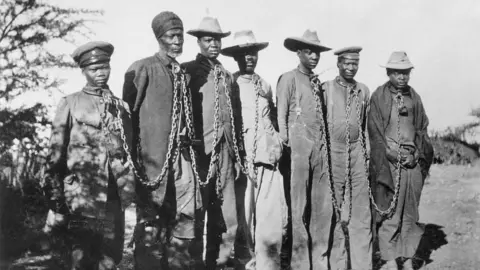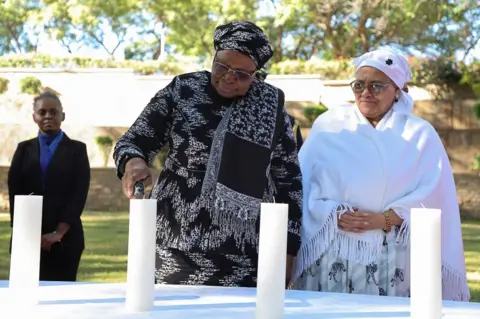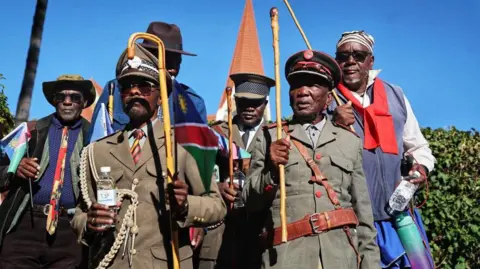 Ullstein Bild / Getty Images
Ullstein Bild / Getty ImagesDubbed “Germany’s forgotten genocide”, and described by historians as the first genocide of the 20th Century, the systematic murder of more than 70,000 Africans is being marked with a national day of remembrance for the first time in Namibia.
Almost 40 years before their use in the Holocaust, concentration camps and pseudoscientific experiments were used by German officials to torture and kill people in what was then called South West Africa.
The victims, primarily from the Ovaherero and Nama communities, were targeted because they refused to let the colonisers take their land and cattle.
Genocide Remembrance Day in Namibia on Wednesday follows years of pressure on Germany to pay reparations.
This new, national holiday is “a symbol of unity and reflection” but the country will never forget its “emotional, psychological, economical and cultural scars”, said Namibia’s President Netumbo Nandi-Ndaitwah, joining community leaders in a candle-lighting ceremony in memory of genocide victims.
Members of the Ovaherero and Nama communities also performed a war cry – a rite that was historically performed by men before battle while women urged them to fight bravely.
Stern words accompanied Wednesday’s symbolism, with President Nandi-Ndaitwah urging a swift end to ongoing negotiations with Germany over Namibia’s demand for reparations.
“Nothing is agreed until everything is agreed,” she said.
 Reuters
ReutersHer government said it chose the date of 28 May, because it was on that day in 1907 that German officials announced the closure of the concentration camps following international criticism.
Control over South West Africa – along with what is now Cameroon, Togo and other colonial territories – was stripped from Germany by competing powers after World War One.
For many years Germany did not publicly acknowledge the mass slaughter that took place between 1904 and 1908.
But four years ago it formally recognised that German colonisers had committed the genocide, and offered €1.1bn (£940m; $1.34bn) in development aid to be paid out over 30 years – with no mention of “reparations” or “compensation” in the legal wording.
Namibia declined that offer, calling it “a first step in the right direction” that nonetheless had failed to include the formal apology and “reparations” it was seeking.
Many Namibians were not impressed by what they saw.
“That was the joke of the century,” Uahimisa Kaapehi told the BBC at the time. “We want our land. Money is nothing.”
He is an ethnic Ovaherero descendent and town councillor in Swakopmund, where many of the atrocities took place, and said “our wealth was taken, the farms, the cattle”.
A group representing genocide victims’ families was also scathing about the deal offered in 2021, calling it evidence of a “racist mindset on the part of Germany and neo-colonial subservience on the part of Namibia” in a joint statement.
Since then a draft deal has been reached between the two nations that would include a formal apology given by Germany, and which would reportedly increase the overall sum by an extra €50m.
But many Ovaherero and Nama campaigners say the deal is an insult to their ancestors’ memory and that they were unfairly excluded from the negotiating table. News of a national day of remembrance has been met with cynicism from some, with community activists saying restorative justice is still a long way off.
 Namibia’s Ministry of Information and Communication Technology/Facebook
Namibia’s Ministry of Information and Communication Technology/FacebookMany campaigners would like to see the German government buy back ancestral lands now in the hands of the German-speaking community, and return them to the Ovaherero and Nama descendants.
Historians point out the irony of Germany hitherto refusing to pay reparations, because prior to the genocide, Germany itself extracted its own so-called reparations from Ovaherero and Nama people who had fought back against the colonisers.
This was paid in the form of livestock and amounted to 12,000 cows – which is estimated by German-American historian Thomas Craemer to be somewhere between $1.2m and $8.8m in today’s money, and which he argues should be added to the reparations bill.
Those colonial lootings and battles were followed by the genocide, which began in 1904 with an extermination order from a German official named Lothar von Trotha.
“This extermination order indicated that they were no longer going to take on any prisoners – women, men, anyone with or without cattle – they were going to be executed,” Namibian historian Martha Akawa-Shikufa told the national broadcaster NBC.
This was followed by the introduction of concentration camps, she added.
“People got worked to death, a lot of people died in the concentration camps because of exhaustion. In fact there were pre-printed death certificates [saying] ‘death by exhaustion’, waiting for those people to die, because they knew they would die.”
The remains of some of those who were killed were then shipped to Germany for now-discredited research to prove the racial superiority of white Europeans. Many of the bones have now been repatriated.
Last year, Namibia criticised Germany after it offered to come to Israel’s defence to stop it answering a case for crimes of genocide in Gaza at the UN’s top court.
“The German government is yet to fully atone for the genocide it committed on Namibian soil,” said then-President Hage Geingob.
Additional reporting by Samantha Granville and Wycliffe Muia
You may also be interested in:
 Getty Images/BBC
Getty Images/BBC







